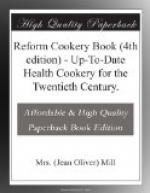prepared at the Colonial Warehouse, Kendal. By a process—which, by the way, is not kept secret—the tea is treated with oxygen in such a way that the hurtful tannin is neutralised, while none of the other properties are affected in any way. There is certainly no loss of flavour, and no difference that one can discern from the usual, but specially good tea—a fact which will appeal to ordinary tea-drinkers, of whom there are still a majority. For any further information regarding this tea, I would recommend readers to a little pamphlet compiled by Albert Broadbent, Esq., food specialist and lecturer, whose writings on the food question, &c., are well known. It is entitled “The cup that cheers.” It explains the process of treatment, and gives medical and analytical testimony in its favour from various authorities of very high standing. The best proof is in the drinking, however, and one may have a sample pound or more carriage paid.
INVALID DIETARY.
The whole of the previous part of this book has been devoted to the contriving of the several meals usual in a work-a-day household and under ordinary circumstances. But exceptions will occur in the “best regulated families,” and although much may be done to prevent illness by pure, nourishing, well-cooked food, one must be prepared for emergencies as they come.
Of course, most of our friends will be only too ready to pounce upon us when illness comes into the house, with their “I told you so” comments. In the first place it will be owing to their low diet and want of proper nourishment that father has got influenza, or Tommy mumps or measles—beef-fed persons never have these affections—(which shows what an enormous proportion of vegetarians there must be)—and in the second place, now that there is illness, you must fall back on beef-tea, port-wine, and other “generous diet,” to get up and sustain the patient’s strength. However callous or deaf you might be to the supplication for the flesh-pots from those in health, you cannot, must not shut your heart to the call of the weak or suffering.
And woe betide us if we are heretic, and the patient does not recover so quickly as we could wish (if he does, we shall be suspected of having surreptitiously called the orthodox nostrums to our aid, but that by the way), so that it behoves us to give the critical and censorious as little room for their strictures as possible.
Now, what are we to get for that erewhile sine qua non of the sick room,
Beef Tea?
Well, before we come to the non-flesh substitutes, which are more similar in some ways to the ordinary beef-tea, we will consider what is given in the earlier stages when the stomach rejects nearly all nourishment.




